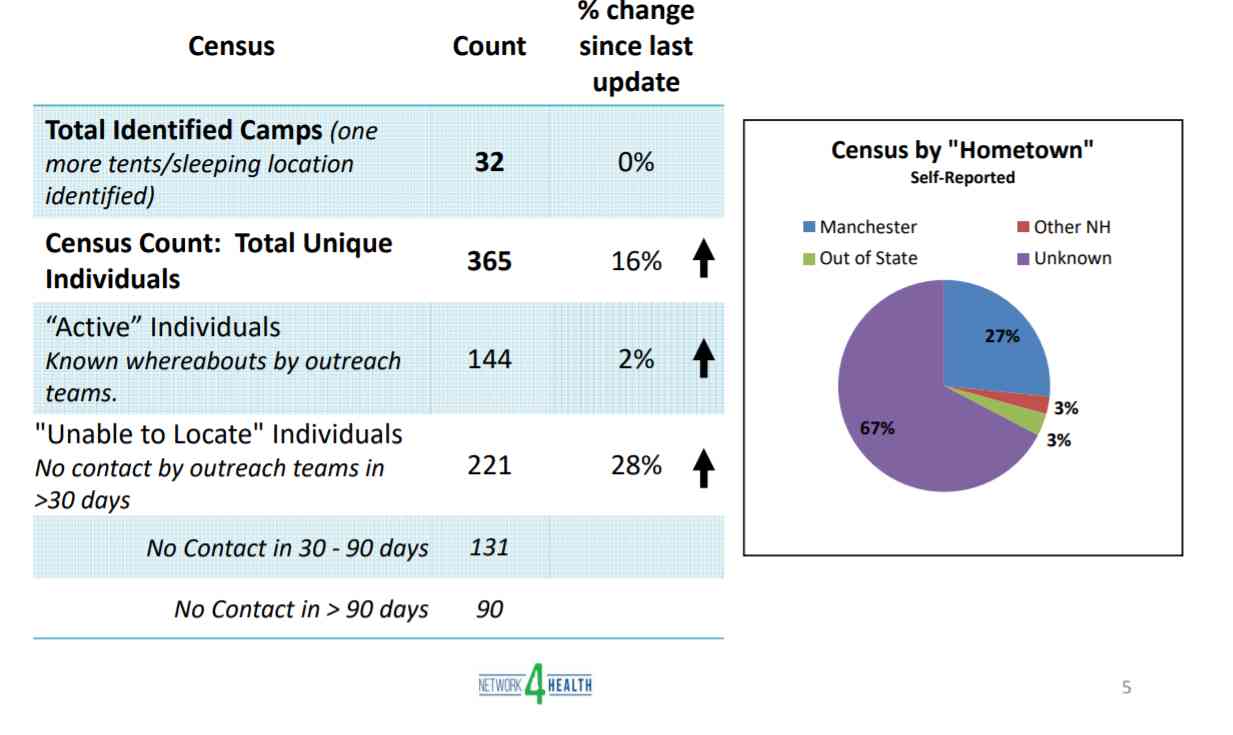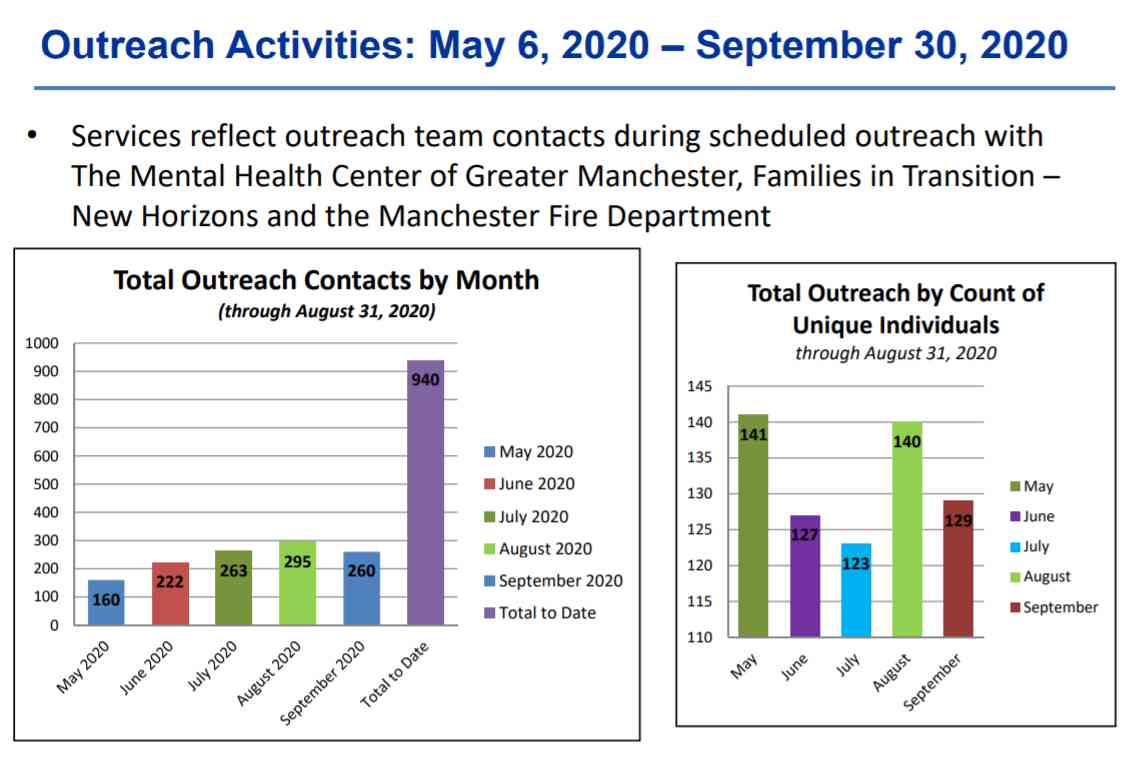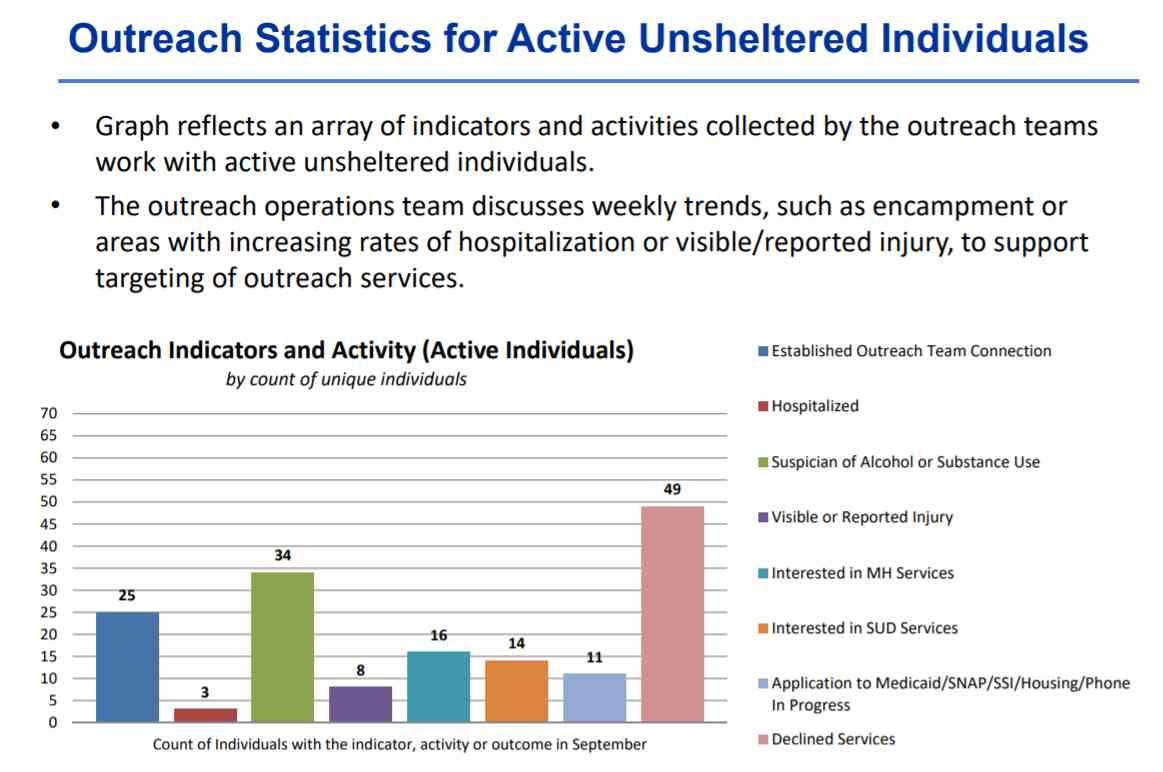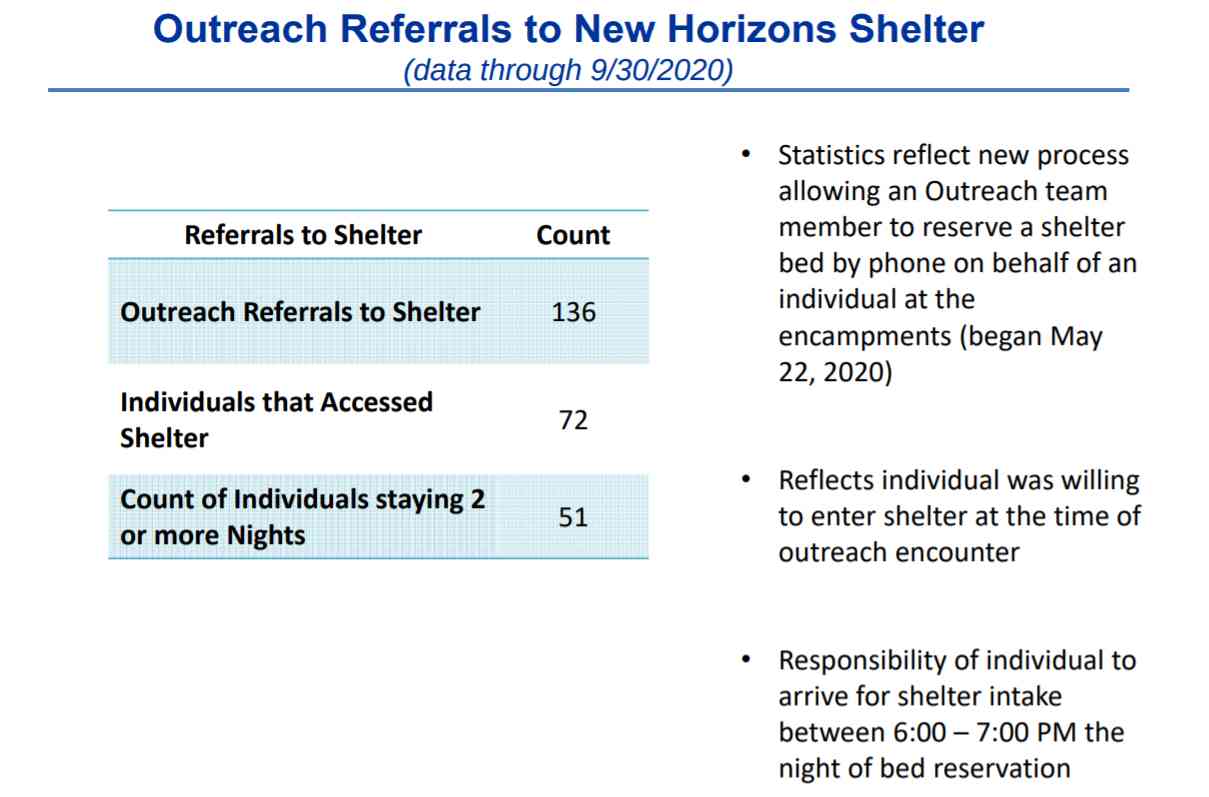
MANCHESTER, NH – If you’re wondering what the plan is to reduce and ideally eliminate the number of people living unsheltered in tents around the city, the answer is there is no plan. Even as the problem – magnified by a pandemic, the onset of winter, and lack of affordable housing options – balloons before our eyes.
That’s because it’s a complicated puzzle with too many missing pieces – shelter beds are mostly filled due to safety reductions for COVID-19, and there’s a lack of tangible housing and mental health resources across the state to keep people who are in crisis in their own communities. These issues and more have been pushing the state’s neediest people into the state’s largest city for any available help.
Tents pitched around Manchester are a visible reminder of the number of people living unsheltered and was a hot topic during Tuesday’s aldermanic meeting. According to a presentation before the board, as of Sept. 30, the city’s homeless outreach team counted 365 people living in 32 camps around the city, a 16 percent increase since the last census. Of those, only 27 percent said they were from Manchester.
Fire Department Chief Dan Goonan said while some people can be cited for trespassing along the railroad tracks, ultimately it’s a shell game of moving people from one location to another, but without long-term solutions.
“There’s nowhere to put people who are out there, even if they want to come in,” Goonan said.
An estimated two dozen of those 365 people have set up tents on property surrounding the county courthouse in the center of the downtown. The property is owned by the state, and with the exception of city police patrols for illegal activity, the city has no jurisdiction to move them.
Below: Slides taken from the Homeless Outreach Team presentation
Although the state put up “no camping” signs two weeks ago on the courthouse lawn, and assured the city that they would begin an action plan last week, so far there has been no action.
Yesterday, Gov. Sununu was critical of the mayor when asked about the homeless issue, and passed the buck back to the city.
“I can not tell you where this literally over $100 million of new money and support has gone in Manchester but there has to be some accountability at the local level,” Sununu said when asked by a reporter about the homeless camps.
There is no public data source available that accounts for where state and federal money has gone this year for homeless services. A majority of funding is allocated to non-profits and other organizations from multiple funding streams, which makes Sununu’s $100 million figure difficult to fact check.
Sununu was in the city Tuesday for a roundtable discussion, “Unleash The Potential,” with a dozen non-profit leaders from the Manchester area to identify obstacles to serving more people in their communities and across the state, hosted by Jason Syversen, a Republican candidate for NH Senate in District 16. Afterward, Sununu was asked by reporters about the homeless camps on courthouse property, and was also pressed on what the state’s plan is to address homelessness.
Sununu said, “We’re opening shelters up, we’re providing resources to expand the shelter’s capacity so they can do the food services so they can expand the capacity both with the overnight shelter services and the day services. All of that is actually happening. So if the mayor is looking for us to come in and just shut everything down, in terms of the state property, and move folks out, it’s about providing that gateway and that bridge so folks have an opportunity to get back in and that’s exactly what we’ve provided, but the city has to be a partner in that.”
His answer about statewide efforts did not align with the information presented during Tuesday’s aldermanic meeting, during which Families in Transition-New Horizons President & CEO Maria Devlin reported the shelter has had to turn people away for the past two weeks.
When asked if he would allow Manchester to remove the camps around the courthouse, Sununu said he hadn’t seen the mayor’s statement [you can read the mayor’s full statement below] adding, “I don’t know exactly what they’re asking.”
But he said the state has “provided the training, the resources, provided the manpower – we’ve provided more opportunity for the city of Manchester to deal with this issue than in the state’s history, far and wide. But there has to become accountability at the local level to get this stuff done,” Sununu said.

As for the state’s plan, Sununu said that each city and town has its own challenges.
“The homeless issue in Manchester is very different than in Nashua, and very different than the rural areas, so what we do is provide those resources and opportunities for all the different cities and towns, knowing at the end of the day they’re there to provide those bridges and those opportunities for those homeless individuals as those cities and towns see fit. It isn’t a one size fits all,” Sununu said. “I know everyone in Manchester thinks that the state should assume the entire homeless issue out of the city of Manchester. That’s not appropriate. We’re there to help and provide aid and services and support, and we do that at an unprecedented level today, but every city and town is very different.”
Craig and city aldermen have, for years, been making the case that Manchester has become the state’s dumping ground for those suffering from addiction and now, dealing with mental health and economic issues often leading to homelessness. They are problems compounded by the pandemic but without adequate state resources coming in to the city to be spent on “building bridges” – or more housing – for New Hampshire’s neediest.
The mayor urged board members to come forward with possible solutions. Ward 8 Alderman Michael Porter, following up on comments by Ward 3 Alderman Pat Long, said he wanted to sit down with Solicitor Rice to discuss possible ordinances that could, for example, prohibit campsites within a half-mile of residential properties.
“We need to stop blaming the state and take responsibility for ourselves,” Porter said.
“We as a city have to do something and it’s not just about housing,” he said, mentioning a call he got from a constituent who had someone from a homeless camp walk into their home in the middle of the night. “We need to talk about tough love that needs to be shown to these people. What are we doing for the victims, the hard-working people of the city victimized by those who are drug-induced? We need to take action – they’re tired of hearing there’s nothing we can do,” Porter said.
Alderman Joe Levasseur also offered a solution.
“Stop being a welcoming city and giving away free stuff,” Levassuer said. When asked by the mayor to elaborate, Levasseur reiterated his belief that Safe Station contributes to the problem, and asked Chief Goonan how many of the 365 people counted in the census came because of Safe Station.
“I came out against Safe Station and got my head kicked in for it,” Levasseur said. “It’s all these policies you vote for and I vote against, stop being a welcoming city for these people and stop inviting them in – that’s my solution. You don’t want to hear it. I’ve been consistent from day one.”
Goonan responded by saying he believed the number who end up homeless after visiting Safe Station was “pretty low,” and noted that Safe Station has been more of an entry point for many who are homeless who get into treatment through Safe Station.
Mayor Craig noted that the governor’s mandated Doorway initiative for addiction services in Manchester at a cost of $5 million operates with limited hours and limited engagement.
“What would this community do if we didn’t have services for people who are in need?” Craig said.
Mayor Craig’s full statement issued Oct. 20 on homelessness in the city and the courthouse campsites:
“Homelessness is a crisis affecting our city, communities throughout our state, and throughout our country. For months, we’ve watched as unsheltered individuals set up an encampment on state-owned land where the Hillsborough North Superior Courthouse is located. And today, it’s estimated that approximately 25 people are living on that state-owned land in Manchester.
The City and our local service providers conduct outreach on a daily basis, and police patrol the area to ensure no illegal activity is occurring. While the City is doing everything it can to keep the area safe, the State has jurisdiction over this property.
In September, the State posted “no camping” signs on the state-owned property, but during a recent call, they did not share any plans to move individuals from the location. Throughout the course of the conversation, the State advised that no one, including unsheltered individuals, would be prevented from being on their property, confirmed there’s no curfew, and made it clear that they were focused on an anti-camping provision, not an anti-loitering provision.
The State cannot move individuals from state-owned land unless they can identify a specific bed for each individual, which is the same situation Manchester and other communities are in. This is why, for over three years, the City has been advocating that the State increase the number of emergency shelter beds, supportive housing, and affordable housing options statewide.
The State plays a significant role in ensuring that all communities have the tools and resources they need to prevent and end homelessness. However, the last time the State completed a statewide plan to address homelessness was in 2006. The State is now in the same position that Manchester and many other communities are in, where unsheltered individuals are living on public land, with no other sheltering options available.
Winter is around the corner. And while we’re actively preparing for emergency winter sheltering and making fatality prevention plans — the City of Manchester can’t solve this problem alone. We all have a shared responsibility to help our most vulnerable residents, and it’s past time for the State to acknowledge their role and take action.”
















